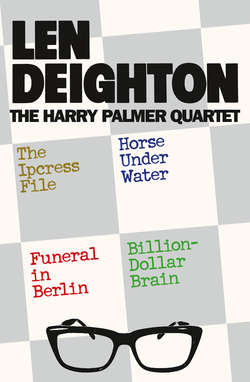Читать книгу The Harry Palmer Quartet - Len Deighton - Страница 45
Appendix
ОглавлениеMEDWAY II
During the dark days of the Mediterranean War when it looked like the Wehrmacht had finished what Darius began, Beirut was a submarine base called Medway II, and was the scene of a topsecret mission. U.307 had been sunk in thirty-eight fathoms of water not far away. In the water-filled U.307 the control room was equipped with a new infra-red sighting device for night viewing above water. It was deep for a diver, but not too deep. It was still wet when we got it aboard the plane, and it dripped over my knees on the way to London, where I met Ross for the first time.
Extract from Handling unfamiliar pistols (Chapter 5). Document 237. HGF. 1960.
In handling Smith & Wesson revolvers the following rules should be observed. PROVIDING that (i) the cylinder has six chambers, and (ii) it revolves anti-clockwise. (Note that Colt cylinders revolve clockwise.) There are 4 categories:
1. .445 inch. Only British or US ammunition marked .455 inch.
2. .45 inch. BEWARE. Not .45 auto ammunition.
3. .45 inch DA. In this .45 auto ammunition can be used but will not extract without two special three-round clips. Extraction can however be effected with the aid of, e.g., a pencil. BEWARE. Not rimmed ammunition.
4. .38. Any pistol with chamber longer than 1.5 inches will take any British or American ammunition except auto ammunition.
These rules only provide a general guide and THERE ARE EXCEPTIONS.
INDIAN HEMP (MARIJUANA)
Prices at time of writing:
Rangoon: 10/- per lb block.
UK (Dockside): £30 per lb.
Wholesale: £50 per lb.
Clubs, etc: £6 per OZ, or 10/6 per cigarette.
(1lb makes approximately 500 cigarettes.)
In 1939 British Military Intelligence used Wormwood Scrubs Prison as its HQ. The prisoners had all been evacuated and the cells were used as offices, each cell being locked when it was vacated as a security measure. However, after a bomb destroyed a section of the building, it was decided to move to a block of offices in St James’s Street, where they remained until the end of the war.
JOE ONE
Near the Holo Archipelago where the waters of the Sulu Sea dilute the Sea of Celebes and the fingers of the Philippine islands grope towards Northern Borneo a B29 of the United States Air Force led a fast-moving shadow through the hot afternoon sun of August, 1949.
Special attachments held photographic plates which soaked up cosmic rays. For months this unit had charted and flown carefully calculated routes across the Pacific. It was a boring detail, and the crews were happy when each long day’s flight was ended and cold showers were waiting to revitalize cramped muscles and an open-air movie helped their minds into neutral. But this day was different, this crew had hardly parked their gum when an urgent call recalled them to the briefing-room.
The photo-lab technicians had got used to developing these plates by now. The image was generally of long wormlike strips of light and often needed a little extra development to get a good contrasty image that made plotting the results much easier. But these plates were absurdly different, they were fogged. Not fogged by daylight but soaked black by an intense concentration of cosmic radiation. Otherwise called a ‘hot’ area. As the Commanding General said at the time, ‘If the atmosphere is taking that kind of cosmic ray penetration we’d better get into the lead suit business.’ But the world wasn’t taking it. This was an atomic explosion.
In that briefing-room in that Pacific USAF base a big truth slowly took shape in the minds of these airmen. There had been no American bomb exploded that year.
The whole base swung into action. One after another the huge B29s trundled around the perimeter track and stepped off the end of the runway into the heavy tropical night air. This time, however, these were planes of the Atomic Bomb Detection Unit which had been formed only the previous year. Special aircraft scooping dust particles from the air as they retraced the path of the afternoon flight. Two Atomic Energy Commission laboratories in the United States had been alerted to stand by for the dust samples.
It took five days before Washington had the detailed report. The explosion it said was almost certainly a bomb. (Until September 23 it was stated that there was a one-in-twenty chance that it wasn’t a bomb.) Moreover the particles indicated a plutonium device. This was an explosion six times more powerful than the Hiroshima one and not to be compared with the first American explosion at Alamogordo.
